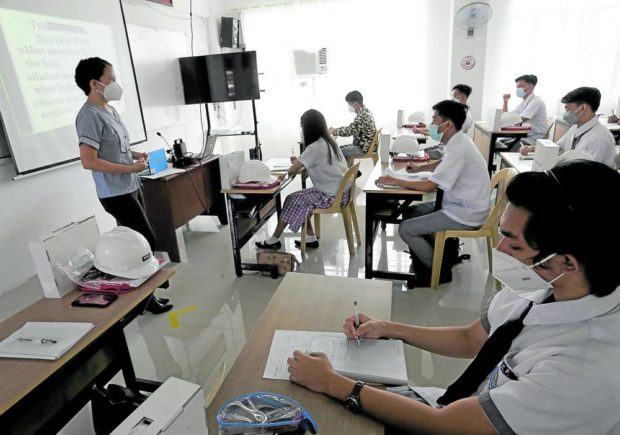Multilingual K-12 curriculum pushed

FACE TO FACE | A class of Grade 12 senior high school students at Sen. Renato “Compañero” Cayetano Memorial Science and Technology High School in Taguig City simulates a face-to-face class in general biology led by their teacher Jermaine San Agustin in this Dec. 2, 2021 file photo. Students in senior high are facing a problem in getting more state financial aid, according to the Private Education Assistance Committee. (INQUIRER PHOTO)
MANILA, Philippines — House Minority Leader Marcelino Libanan wants Philippine schools to produce multilingual kids, calling for the inclusion of foreign languages other than English in the K-12 curriculum.
On Sunday, Libanan, the Pagtibayin at Palaguin ang Pangkabuhayang Pilipino (4Ps) party-list representative, urged the Department of Education (DepEd) to help develop among Filipino youth a passion for learning foreign languages possessed by national hero Jose Rizal.
The lawmaker filed House Resolution No. 910 calling for the DepEd to integrate foreign language studies, other than English, in the basic education curriculum as it conducts a review of the K-12 program.
Vice President and Education Secretary Sara Duterte, in her 2023 Basic Education Report, earlier said that the DepEd intends to revise and improve the K-12 program aimed at developing lifelong learners who are competent and job-ready.
According to Libanan, “Our school system by tradition has been teaching Filipino children to emulate and aspire to be like Rizal. We might as well encourage them to study foreign languages, just like Rizal.”
Article continues after this advertisementLibanan claimed the national hero was conversant in Arabic, Catalan, Chinese, Dutch, English, French, German, Greek, Hebrew, Italian, Japanese, Latin, Portuguese, Russian, Sanskrit, Spanish, and Swedish.
Article continues after this advertisementLibanan pointed out, “The whole world has become a global village with multilingual labor markets, thus creating a strong demand for workers with foreign language skills.”
He noted that exposing young learners to foreign languages “will vastly improve their employability in the global labor markets of the 21st century,” adding that global corporations in the United States, China and Japan prefer workers who can speak a second foreign language besides English.
Libanan cited data from the Department of Migrant Workers, which showed that the country deployed 2.1 million workers abroad in 2019, which has since dropped to less than a million in succeeding years due to the COVID-19 pandemic. The number of deployed overseas Filipino workers (OFWs) dropped to some 550,000 in 2020 but increased to nearly 800,000 in 2021.
According to a World Bank report, the Philippines received some $38 billion in cash remittances in 2022, making the country the fourth largest recipient of money from OFWs.